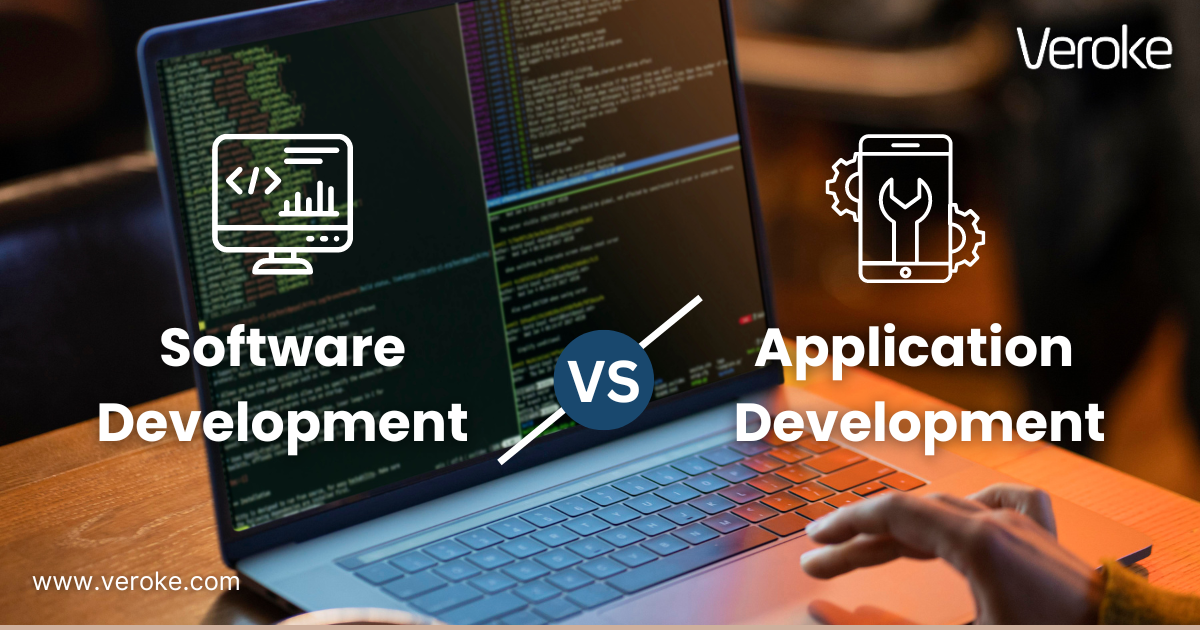Let’s say you are starting a new venture and need to create an application or software for that.
But you’re not sure which route to take: should you go for application development, or should you hire an IT company for custom software development?
Deciding this can be challenging. And without proper knowledge, you might end up on a path that doesn’t help you achieve your goals or the problem you’re looking to solve.
Well, if this sounds relatable, don’t despair. Because we are going to discuss these options in detail, helping you decide which is the best option for your business.
Before we dive in, let’s explore the potential these two options boast within. The growing volume of corporate data and automation of processes makes the choice between application and custom software critical.
It has an impact on your business efficiency, productivity, and profitability. According to Grand View Research, the market size of application and custom software is expected to expand at a CAGR of 19.4% from 2022 to 2030. The global market for custom software development is estimated to grow by 22.3% by 2030.
So, being a leading company in custom software development, Veroke is keen to share its expertise in choosing this option. This article will cover the key factors to consider, helping you make an informed decision.
Whether you own a business or a startup, this guide provides essential insights for choosing the right solution.
Key Takeaways
Custom software development offers tailor-made solutions designed to meet specific business needs, whereas application development provides pre-built software intended for general use.
Application development, using existing frameworks, generally incurs lower costs and quicker deployment times. But custom software typically requires more time and a higher initial investment due to its bespoke nature.
Tailor made software is optimized for specific workflows, offering potentially better performance in specialized environments. Whereas, off the shelf application ensures broad usability but may not be optimized for unique business processes.
Bespoke solution is best suited for businesses with unique, complex needs that off-the-shelf solutions cannot adequately address. And application development is ideal for businesses that need standard software to handle common tasks.
Quick Comparison
|
Feature |
Custom Software Development |
Application Development |
|
Customization |
Highly customizable to exact requirements. |
Limited customization options. |
|
Cost |
Higher initial investment |
Lower initial cost |
|
Maintenance |
Continuous monitoring is required |
Regular updates based on the changes in the platform |
|
Scalability |
Easy to scale |
Require additional solutions to scale |
|
Integration |
Easy to integrate |
Integration requires customization |
|
Time to market |
More time because of customization |
Faster deployment |
Defining Custom Software Development

Custom software, also known as bespoke or tailor-made software, is specifically developed for a particular organization or individual to address their unique requirements and business processes. This development process is handled by professional software developers or development teams who work closely with the client to understand the workflows and objectives.
The process of custom software development involves several critical steps, including designing, programming, documenting, testing, and bug fixing. These steps ensure the creation and maintenance of applications, frameworks, and other software components that effectively meet user requirements.
Custom software solutions are tailored to an organization’s needs, including specific features, functionalities, and integrations for their operations. Examples of custom software include enterprise resource planning (ERP) systems, customer relationship management (CRM) software, and inventory management systems.
Key Characteristics
Tailored Solutions: Custom software is designed to meet the specific needs of an organization, providing a unique solution that fits perfectly with their processes and requirements.
High Customization: It offers extensive customization options, allowing businesses to modify and enhance the software as their needs evolve.
Scalability: Can be scaled to accommodate growth, ensuring it continues to meet business needs as the organization expands.
Integration: Custom solutions can be integrated seamlessly with existing systems, enhancing overall operational efficiency.
Stakeholder Collaboration: The development process involves continuous collaboration with stakeholders to achieve the goal.
Ownership: Businesses have full ownership of the custom software, giving them control over its use and future development.
Defining Application Development
Application development involves creating pre-built software packages or applications designed for general use by a wide range of users or organizations. These applications, often referred to as off-the-shelf or commercial software and are developed to fulfill specific tasks or functions.
Examples of these tasks include word processing, spreadsheets, email management, graphic design, and project management. Notable examples of application software include Microsoft Office, Adobe Photoshop, and Google Chrome. These applications are readily available and can be purchased or downloaded to meet the specific needs of users.

Key Characteristics
Standardization: Applications are designed for mass use, providing standardized solutions to common needs.
Quick Deployment: Since they are pre-built, application software can be quickly implemented and used immediately after purchase.
Cost-Effective: Generally, these applications are less expensive initially compared to custom software solutions.
More Reliable: Commercial software is extensively tested and used by many users, ensuring a certain level of reliability and performance.
Limited Customization: Off-the-shelf software may have limited customization options, making it less adaptable to specific or unique business needs.
Wide Accessibility: These applications are easily accessible and can be downloaded or purchased from various sources.
Key Differences Between Custom Software and Application Development
Software development covers the entire lifecycle of creating various software types, including applications. Application development, however, focuses on designing and building applications for specific use cases, platforms, or devices, emphasizing user-centric functionalities.
Let’s explore the key differences in detail:
1. User Experience and Design
Custom software development uses frameworks to create functional solutions across multiple applications, aiming to reduce costs and development time. Whereas, application development prioritizes delivering a seamless, intuitive user experience tailored to the application’s specific functionalities.
2. Performance Optimization
When it comes to performance, custom software development takes a broader approach, while application development specifically focuses on enhancing performance for mobile or resource-constrained platforms. To enhance the overall user experience, developers employ platform-specific techniques that ensure efficient app performance, responsiveness, and resource usage.
3. Platform and Target Audience
Custom software development encompasses a wide range of applications suitable for various platforms, including desktops, servers, and embedded systems. Instead, application development is specifically tailored for targeted platforms like mobile devices or web browsers. Understanding the target audience’s specific needs is important in application development to ensure the software meets user expectations on those platforms.
4. Programming Languages and Tools
In application development, the choice of languages and tools is often influenced by the targeted platform or operating system. This approach ensures optimal integration and performance. Custom software development utilizes programming languages and tools that best fit the project’s requirements.
5. Distribution and Deployment
Software development involves various distribution methods, from physical media to online downloads. And the application development focuses on streamlined distribution through app stores or web deployment. This approach simplifies user access and ensures a controlled and efficient deployment environment.
6. Operating Systems and Ecosystems
Custom software development is flexible and can work with various operating systems and ecosystems. Nonetheless, application development is commonly geared towards a particular operating system or ecosystem, like iOS or Android.
7. Updates and Maintenance
Custom software projects may require periodic updates to address bugs and add new features. But off-the-shelf application often demands more frequent updates due to ongoing platform changes, security patches, and user feedback. Continuous maintenance is vital in application development to ensure the application remains secure and up-to-date.
8. Testing and Quality Assurance
Both custom software development and application development involve rigorous testing and quality assurance. Yet, application development prioritizes platform-specific testing for compatibility and optimal performance in the target environment. Comprehensive testing methodologies are employed in both domains to maintain high-quality standards and deliver reliable software solutions.

Making the Right Choice Between Custom Software Development and Application Development
Choosing between custom software development and application development requires careful consideration of various factors such as project scope, target audience, and platform requirements.
Here are some common factors that you should consider to make an informed decision:
- Platform Compatibility
Make sure your solution is compatible across different systems, including desktops, laptops, smartphones, and tablets. Consider the operating systems you need to support, such as iOS, Android, or Windows, along with technical requirements like RAM size and processing power.
- Purpose of the Application or Software
Define the purpose of your application or software. Identify the key functionalities needed, prioritize them, and consider user experience requirements. As discussed, for complex projects with diverse functionalities, software development is ideal. For focused projects tailored to specific platforms, application development is a better choice.
- Maintenance and Updates
Factor in the maintenance and update requirements. Software development may involve less frequent updates but demands comprehensive maintenance. Application development often requires regular updates due to evolving platforms and user expectations. This necessitates continuous maintenance for optimal performance.
- Functionality and Features
Another key thing to consider is to evaluate the required functionality and features. Bespoke solutions cater to comprehensive functionalities across various domains. But application development is suitable for projects needing specific features tailored to targeted user requirements.
- Development Time and Resources
Assess the development time and resources available. Custom solutions may require more time and resources due to extensive functionalities, whereas tailor-made solutions are more quicker and resource-efficient, especially for platform-specific solutions. Choose based on the project’s urgency, scale, and the resources at hand.
Final Verdict
Choosing between off-the-shelf and bespoke solutions hinges on your business’s unique requirements and processes. If your company requires a solution tailored precisely to your operational practices, a bespoke or tailor-made solution is the optimal choice.
Building applications from scratch eliminates the need to adapt to pre-built software workflows, allowing you to continue with your established processes seamlessly. But if you need a quick, cost-effective solution with standard functionalities, application development might be more suitable.
Why Choose Veroke?
Veroke can be your strategic partner for your custom software and application development needs. With over 15 years of experience in custom software development, DevOps, product development, UI/UX design, and team augmentation, we are experts in transforming ideas into digital realities.
Our team consists of professional engineers and project managers who understand the intricacies of various industries, including fintech, ed-tech, health tech, loyalty, and facility management.
Our unique selling proposition is offering comprehensive support and 24/7 monitoring. This ensures that your software remains secure, up-to-date, and performs optimally around the clock.
So, if you have an idea or looking to solve a problem and need a custom-built solution or an off-the-shelf application, Veroke is here to help. Schedule a free consultation with us today and allow us to transform your idea into a reality.
FAQs
1. What is the difference between custom-designed and ready-made applications?
Custom-designed software is tailored for specific purposes or long-term goals, often costing more but offering benefits like enhanced security, continuous upgrades, and full ownership. Ready-made software is generic and not developed for any specific user or purpose.
2. What is the difference between generic software development and custom software development?
Generic software is designed for broad use with future updates in mind. Custom software is modified as per customer needs, tailored to specific timeframes, budgets, and requirements defined by the client.
3. Who needs custom software development?
Large organizations with complex processes and unique requirements that off-the-shelf software can’t meet. This can help businesses automate operations, streamline workflows, and improve efficiency.
4. What is the main difference between customized software and custom-written software?
Customized software requires implementation by experts (software development companies, analysts, programmers), while custom-written software is already developed for specific needs, requiring businesses to adapt to it.



